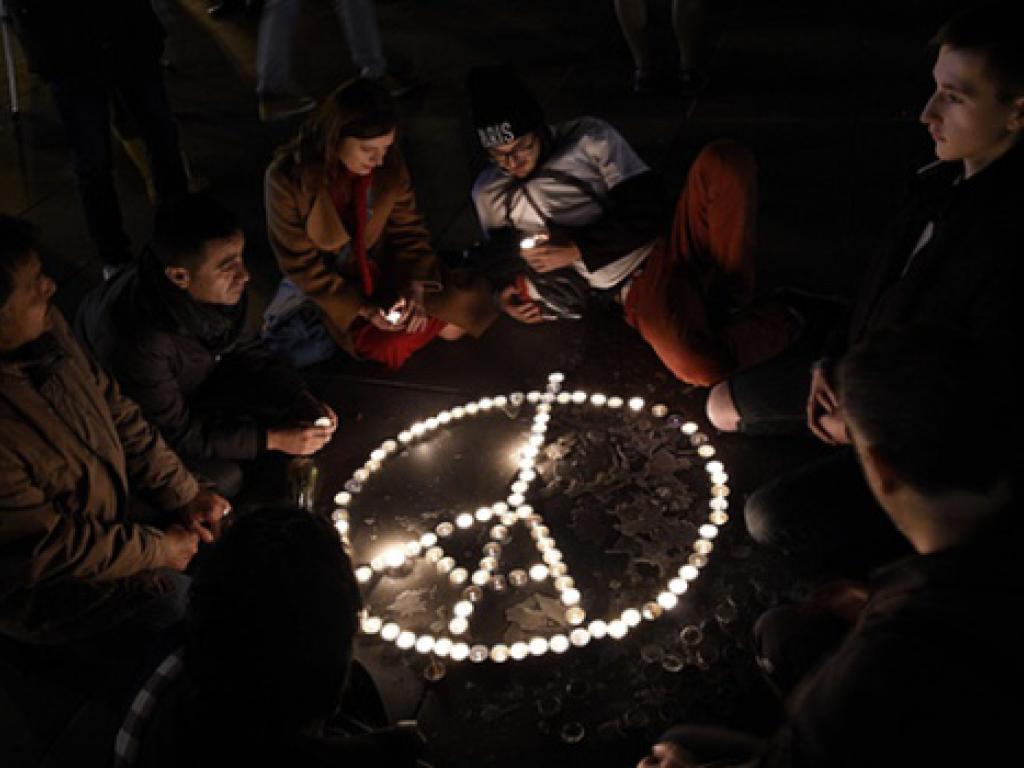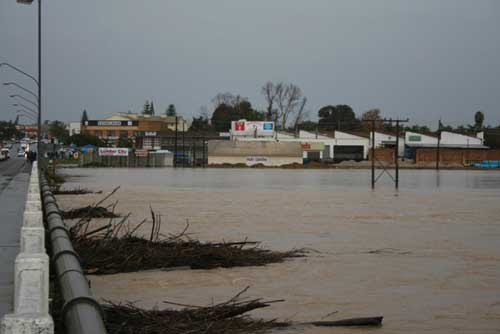Climate of catastrophe and commitment

Published from origional article in the Adaptation Network's November 26th, 2015 Newsletter.
Catastrophe. The word has a terrible ring – you can almost hear the cataclysm unfolding, as you say it aloud. Previously, could it be that we used this word more rarely, to describe wars and famines that would scarcely touch many of us? Or is that just wishful thinking, merciful amnesia? Whatever the case, the word now permeates our vocabulary and infects our zeitgeist.
Lately, it is related to violent insurgence: Beirut, Paris, Bamako, and northern Cameroun – to name only some of the events of the past two weeks. Are these catastrophes, or ‘just’ tragedies? For the families of the victims, and the communities in which they take place, they must feel cataclysmic. Lives are torn apart, dreams are vaporised; things will never be the same.

Image: Flooding in Vredendal, 2008. Extreme weather events are projected to become more frequent and intense as climate changes (Noel Oettlé).
On the climate front, superstorms like Haiyan in the Philippines and Sandy on the eastern seaboard of the USA have ratcheted up our use of the C-word, by wreaking huge damage on people, their livelihoods and infrastructure. We can add Australia’s ‘angry summer’ of 2012-2013, which broke 123 climate records in 90 days, and this year’s El Niño, described as a ‘Godzilla’ by NASA, which promises to deliver a monster drought in Ethiopia and epic floods in Peru.
Heat and water, intensifying in the atmosphere and decoupling in the soil, drive changes in the biosphere and take on new meanings in our minds. In the oceans, we have heat and acidity coming together in previously unknown ways, changing physical and biological processes in ways that do not bode well for climate stability. We now know that if business as usual continues, we are on track for an average global temperature increase of between 3.5 and 5 degrees Celsius by 2100. We may even exceed a 2 degrees increase by the middle of the century.
To this potent mix, we can add the interlinked effect of sea level rise, possibly coming faster and higher than we had thought. Since the IPCC Fifth Assessment, scientists have warned more strongly of the growing risks of large-scale ice sheet collapse in Greenland and Antarctica. Many glaciers have been speeding up in recent years, with studies now showing that the Amundsen Basin in the West Antarctic has likely crossed a tipping point. This means that the retreat of the basin’s glaciers has now become irreversible, in all likelihood. Should the entire Amundsen Basin drain into the ocean, this would raise sea level by 1 metre, inundating cities like Banjul in The Gambia, and unique ecosystems like Florida’s Everglades. The impacts on low-lying food growing areas will be disastrous, if we are not prepared and do not act decisively and well in advance.
Things could be even worse: there are signs that other Antarctic glaciers may also be retreating irreversibly. If the entire West Antarctic ice sheet were to collapse, sea levels would rise by 5 metres. And if the same were to happen to East Antarctica, this would raise sea levels by 50 metres. This would happen over long timescales – hundreds to thousands of years, as far as we know at this stage, but it’s barely possible to imagine the consequences – we would need a new word to describe the catastrophe.
In a week’s time, both of these threads of violence and climate will come together in the world’s imagination, as the 21st session of the Conference of the Parties to the United Nations Framework Convention on Climate Change (COP21) takes place in Paris. The conference will be held under the tightest security, with many of the supporting events curtailed. The planned Climate March is cancelled. Some in civil society rail against this ‘shutting down of the people’s voices’, while others are silently relieved, acknowledging that this may be pragmatic rather than political. Some are considering not even going to the former city of light for these crucial negotiations.
To go or not to go is an individual choice. But whether we are there in person or spirit, we cannot be deterred from action, because climate change could pose even an stronger threat to global security, equitable development, and human well-being than the attacks that now increasingly blight our world. As Rebecca Solnit wrote in The Guardian last year, “Call climate change what it is: violence”.
Even if it is true, as some scientists think, that we have missed the chance to prevent 2 degrees warming, not to mention the 1.5 degrees that is preferable, we still cannot give up. Internationally, we must be more determined than ever to forge a strong global climate change agreement. And beyond that, we must act in a multitude of other ways – as individuals, rural groups, city governments, youth caucuses, regional organisations, businesses – to drive down emissions and implement adaptation.
We can follow the example of the Parisians gathering in the Place de la République a week after the attacks, who showed that Paris will not be shut down; and of the president of Mali two days after the attack on the Radisson Blu hotel in Bamako, who vowed that the country would not surrender. In so doing, we can let catastrophe, present and future, real and projected, fuel our commitment.
Disclaimer: The views expressed here are solely those of the author in her private capacity and do not in any way represent the views of the ACDI, or any other entity affiliated with the ACDI.